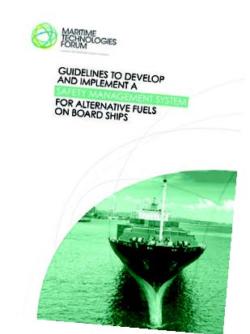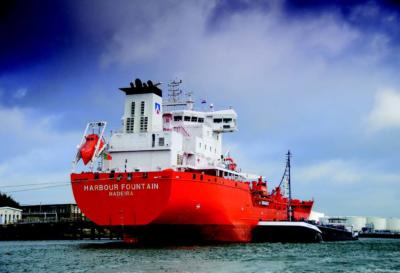MTF launches novel fuel guidelines
Guidance to develop and implement a Safety Management System for alternative fuels on board ships
By Capt Jeff Parfitt FNI, Head of Safety and Environment, The Nautical Institute
The Maritime Technologies Forum (MTF) has recently published proposed guidelines regarding alternative fuels and their relationship to the Safety Management System (SMS). The report suggests that companies may use these guidelines to develop a new SMS or adjust their existing SMS for alternative fuels on board their fleet. The MTF also recommends that these guidelines may be used in addition to other emerging guidelines to ensure safe application of alternative fuels on board ships.

Why are guidelines needed?
The Maritime Technologies Forum (MTF) is a group of classification societies and flag state administrations, aiming to bridge the gap between technology and regulatory progress.
With the current focus on safe maritime decarbonisation, the MTF identified gaps in the implementation of the ISM Code, STCW and MLC. The Guidelines to develop and implement a Safety Management System for alternative fuels onboard ships were developed with industry stakeholders in response to these gaps. The Nautical Institute was pleased to be invited to take part in this initiative.
The report focused on three areas in particular where gaps in the ISM Code’s implementation were apparent:
- Uncertainty related to Safety Management System requirements, development, and implementation.
- Uncertainty related to emergency procedure development.
- Uncertainty related to maintenance measures.
A theme that runs through the report is that alternative fuels possess ‘elevated operational and environmental risks’. These risks can be considered as more severe than similar risks associated with ‘conventional’ fossil fuels due to the uncertainties listed above.
Significant attention is focused on structured risk management. A key objective of the ISM Code is to assess and mitigate all identified risks with control measures and it may be necessary to implement such measures in the SMS.
Another key comment is that at this early stage in the introduction of novel fuels there is, inevitably, a lack of data from operational experience. This in turn creates a gap in understanding and experience. This makes the safety recommendations contained within this report even more important.
Crucially, these risks will change and develop as equipment and operational practices mature:
- Equipment – The equipment associated with alternative fuels in some cases will bring variability as we are dealing with novel technology that will go through iterations of improvements.
- Operational – The variability brought in by the alternative fuels to the operational environment is certain, but the extent and intensity will be dependent on the characteristics of the alternative fuel.
The report draws special attention to the significance of learning from hazardous occurrences, non-conformances, and accidents in order to close the safety gaps that it highlights. It emphasises how these learnings are relevant to emergency preparedness. These recommendations fit closely with the comprehensive risk assessments companies should carry out.
SEP
Considerable emphasis is placed on the company Safety and Environmental Protection Policy (SEP), which it says ‘sets the tone for the safety and environmental protection culture in the organisation.’ The report explains how an SEP referencing the ‘elevated operational risk’ will reflect the company commitment to manage the risk and how this should ensure the SMS is fit for purpose.
The need for training…
The report places a major emphasis on training and familiarisation of operational personnel:
‘Safe operations with alternative fuels will require an assessment of the competency, training, familiarisation, and resources relevant to the specific alternative fuels. The human element in the operations associated with the handling, storage and utilisation of alternative fuels is critical, and should be considered to ensure safe operations.’
It confirms that at present, the STCW training requirement does not sufficiently cover gases and low-flashpoint fuels. It goes on to recommend that as an interim measure, the crew may undergo training according to the International Code of Safety for Ships using Gases or other Low-flashpoint Fuels (IGF Code) as per the STCW requirements (section V/3) supplemented by fuel specific training. However, one problem is that at present, there is no known fuel specific training.
… at all levels
The emphasis on the importance of training does not stop with the crew. There is a strong recommendation that attention should be paid to this at all levels, including those with direct managerial responsibilities. Senior management has a crucial role to play in the safe deployment of alternative fuels within the fleet, and high level managers should understand that training and awareness of personnel is essential.
Attention is drawn to the responsibilities of executive managers, in particular the Designated Person Ashore (DPA). Executive managers should be more focused on ensuring DPAs are equipped for dealing with issues surrounding novel fuels. A key recommendation is that the DPA should understand the risks associated with operations involving alternative fuels, and should have training related to elements of the SMS.
Very few escape attention in the company hierarchy when it comes to responsibilities directly connected to vessel operational safety. There is a significant section on ‘Resources and Personnel’, which in turn highlights the increased importance of competence, training, and awareness of ship’s personnel in this new operational environment: ‘It is the responsibility of the company to ensure that ships in their fleet are manned with competent and trained personnel commensurate with the responsibility of the individual roles.’
Master’s responsibility
The ISM Code clearly sets out the overriding authority and responsibility of the Master. It is important that this responsibility includes promoting the safety culture on board and implementing company policies and procedures.
As the report puts it: ‘It places the responsibility on the Master to ensure that the person with immediate responsibility for the fuel on board has the appropriate certification and adequate practical experience. The Master, while retaining the overall responsibility of the vessel, delegates the management of the alternative fuels to the role documented in the SMS as the ‘person with immediate responsibility.’
Of significance in this section is the term ‘person with immediate responsibility’. This defines the person in a decision-making capacity for the handling of fuel as addressed by the IGF Code or other fuel-related operations. In most cases we would suggest the ‘person with immediate responsibility’ will be the Chief Engineer.
Shipboard operations
The report makes detailed reference to existing standards and industry guidelines developed for established fuels such as LNG as well as the chemical, liquefied gas and fuel cargo sectors. There is considerable expansion on defining risk management along with recommended actions.
‘With the novel nature of the alternative fuels, development of new operational procedures or amendment of existing ones will be based on inherent characteristics of the specific fuel and assessment of perceived operational risks but may lack the operational data. The effectiveness of the procedures within the SMS that provide practical feedback on non-conformities, accidents, and hazardous occurrences (including nearmisses) related to alternative fuels is crucial.’
Suitably relevant sections on maintenance, documentation and verification complete the report recommendations.
In conclusion, this report makes some excellent key recommendations to encourage the safe application of alternative fuels in the hope this will enhance and strengthen existing company SMS. But the question remains, where is this knowledge and experience to come from when there is virtually no operational experience? And who trains the trainers?

